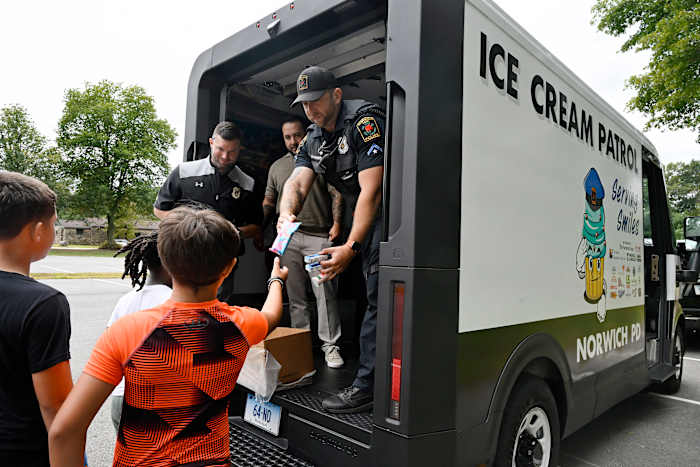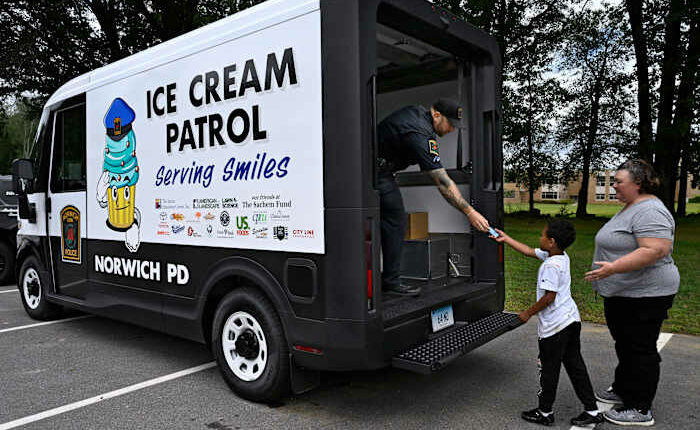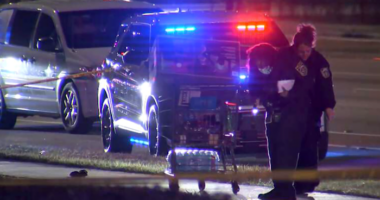Share this @internewscast.com

NORWICH, Conn. – Across the United States, police departments are getting their own ice cream trucks and offering free frozen treats to neighborhoods, with plenty of playful slogans to accompany their efforts.
In Danbury, Connecticut, their truck features “Copsicle Patrol,” while Pittsfield, Massachusetts, goes with “Freeze! You have the right to remain frozen.” Cleveland’s truck invites you to “Let’s Chill Together.” In Palm Bay, Florida, the slogan is “Frosty Five-O. Get the inside scoop,” and Toledo, Ohio, has gone with “To Protect and Soft Serve.”
Beyond the humorous phrases, more police departments are adopting these trucks for an important goal: fostering positive interactions with the community at a time where stories of police misconduct occupy the news.
Lt. Kyle Besse from the Norwich, Connecticut, police described the purpose of giving out free ice cream to kids: “There’s no better way to make the police approachable and show we’re just like everyone else. The joy on the kids’ faces confirms this is a fantastic community engagement tool.”
The all-electric Chevy BrightDrop van of the Norwich police was introduced in early August, with around 90% of its $43,000 cost being covered by donations from local businesses and supporters, while the city covered the remainder. Some other police departments have used funds from legal marijuana taxation and asset seizures to finance their ice cream initiatives.
‘Seeing kids be happy’
Recently, the Norwich van visited a school during sports camps, much to the delight of the children who enjoyed ice cream sandwiches, bubble gum-flavored pops, and Italian ices offered by the officers.
“Instead of seeing people in jail, they’re seeing kids be happy,” said 11-year-old Rozzy Constant, who opted for the bubble gum pop.
The truck later rolled into an apartment complex. In a police cruiser accompanying the truck, Besse used his phone to play ice cream truck songs through the exterior loudspeaker. The department is now raising money to outfit the truck with its own sound system and police lights.
Angela Pires heard the music and rushed out with her grandchildren.
“It’s a great idea. Not everybody can afford it,” she said. “Police get a lot of bad publicity. It’s about time that they get good things said about them.”
Marijuana tax and property seizures fund some programs
Like Norwich, many departments’ ice cream truck programs are funded by donations, and the treats they hand out for free are often provided to them at no charge by local businesses like grocery stores and ice cream shops. Norwich police list 20 sponsors on their truck.
In Danbury, Connecticut, police used tax revenue from the city’s legal marijuana dispensaries to pay for their truck, which hit the streets in July and was the first one in the state.
In Chicopee, Massachusetts, police paid for theirs with assets seized during criminal arrests. That practice, called civil forfeiture, has been criticized by criminal justice advocacy groups because state and local laws allow law enforcement to take property from someone suspected of criminal activity and keep it even if criminal charges are never filed.
And some departments have used federal law enforcement grants to help fund the projects.
Paul Poirier, the police chief in Barnstead, New Hampshire, used his own money to buy an old ice cream truck that he refurbished with a friend and donated to his department a couple years ago.
Today, he runs a business named Copsicle Ice Cream Trucks in his spare time that restores and repairs ice cream vehicles to sell to police departments starting at around $37,000.
“I figured, you know what, this would be a great opportunity for the kids and families to get free ice cream and make those connections and see the police in a more positive light,” said Poirier, who said he’s been fielding calls from police departments as far away as California showing interest in the trucks.
Boston police hand out ice cream for 15 years
Boston police are widely credited with having the first official police ice cream truck in the U.S.
In partnership with the HP Hood ice cream company, whose half vanilla and half chocolate ice cream cups are iconic in New England, the city began “Operation Hoodsie Cup” in 2010. Police in other parts of the country, including St. Louis, Miami and Milwaukee, would deploy their own ice cream trucks in the following years.
Over the past 15 years, Hood has donated all the ice cream for Boston’s truck, which goes to more than 400 events in city neighborhoods each year, police said. Its current truck was donated by the nonprofit Boston Police Foundation in 2016.
“Each interaction is an opportunity for our officers to build trust with community, and to make some smiles in the process,” said Boston Police Commissioner Michael Cox said in a statement.
The ice cream trucks are another program in a long line of community policing initiatives that many departments have put in place over the years, such as “Coffee with a Cop” and youth sports programs.
Whether the trucks are actually improving the public’s opinion of police over the long term isn’t clear due to a lack of research on the subject, said Kenneth Quick, an adjunct professor at John Jay College of Criminal Justice in New York and a former New York City police inspector.
“I like that it is bringing the police out in the community, sort of showing them in a different light, that they are humans,” Quick said.
However, he asked, “Is this an actual meaningful interaction that’s really going to shape somebody’s long-term perceptions about the police, or is it going be ‘I got a free ice cream sandwich from some cop in an ice cream truck’ but yet later on down the road when I actually have a meaningful interaction my perceptions are the same?”
Copyright 2025 The Associated Press. All rights reserved. This material may not be published, broadcast, rewritten or redistributed without permission.










